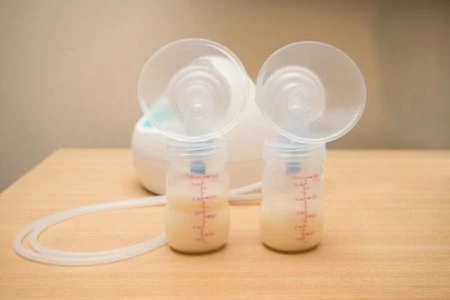Hearing a rhythmic *click-click-click* while nursing? It’s unnerving, right? You’re staring at your baby, wondering if that noise is a cute quirk or a red flag.
Babies are noisy eaters. Between the grunts, gulps, and sighs, it can be tough to figure out which sounds are part of the dinner conversation and which ones signal trouble.
We’re here to clear up the confusion. Let’s break down why that clicking sound happens, how to tell if it’s affecting your baby’s feed, and simple ways to fix it so you can both get back to a peaceful nursing session.
Key Takeaways
- Suction Breakers: Clicking usually happens when the suction seal is broken due to a shallow latch or positioning issues.
- Common Culprits: Oversupply, tongue ties, ear infections, and thrush are frequent causes of clicking noises.
- Red Flags: Watch for dimpled cheeks, nipple pain, or misshapen nipples after feeding, which indicate a poor latch.
- When to Get Help: If nursing hurts or your baby isn’t gaining weight, consult a lactation consultant immediately.
Normal Sounds During Breastfeeding
First, take a deep breath. Noisy nursing is often completely fine. Most sounds just mean your baby is working hard to get the nourishment they need. Here are a few sounds that are usually music to a mom’s ears (1):
- Soft sighs: Satisfied exhales while eating.
- “Cuh” sounds: A soft “cuh” or “kah” sound usually means milk is flowing well.
- Gulping: Rhythmic swallowing.
- Grunting: Often a sign of effort or pooping while eating.
Why Is My Baby Clicking?
While normal swallowing sounds are great, a sharp “click” or “smack” usually means one thing: the vacuum seal has been broken. Your baby is losing suction on the breast, and the tongue is snapping back against the mouth.
Here are the six most common reasons why that seal keeps breaking (2).
1. The Firehose Effect (Oversupply)
If you have a forceful let-down or an oversupply of milk, your baby might be struggling to keep up. Think of it like trying to drink from a firehose. To handle the deluge, your baby might break suction to catch a breath or gulp rapidly, creating that clicking noise.
2. Rock-Hard Engorgement
When breasts are engorged, the tissue becomes hard and tight. This flattens out the nipple and areola, making it incredibly difficult for a newborn to grab a mouthful of breast tissue. They might slip off repeatedly, causing a clicking sound as they try to maintain a grip on the slippery surface.
3. A Shallow Latch
This is the most frequent offender. If your baby is only sucking on the nipple rather than taking in a large mouthful of breast tissue, they can’t maintain a vacuum. They have to constantly adjust their tongue and lips to hold on, resulting in a repetitive click.
4. Tongue Tie (Ankyloglossia)
Sometimes, anatomy is the issue. If your baby is tongue-tied, the band of tissue connecting the tongue to the floor of the mouth is too tight or short (3).
Because their tongue can’t lift or extend properly to cup the breast, it snaps back down during sucking. This creates a distinctive clicking sound and often causes significant nipple pain for you.
5. Ear Infections
Sucking requires strong jaw pressure. If your baby has an ear infection, the motion of nursing can change the pressure in the ear, causing pain. To relieve that pressure, your baby might stop sucking mid-feed or break the seal to relax their jaw.
6. Thrush and Yeast
Thrush is a yeast infection that can make your baby’s mouth sore, itchy, and sensitive (4). Because their mouth hurts, they may struggle to hold a firm latch. If you also have shooting pains in your breast or itchy nipples, thrush could be the culprit for both of you.
How to Stop the Clicking
If the sound is driving you crazy or causing pain, try these adjustments to get a quieter feed.
- Break and relatch: Don’t just let them click. Gently break the suction by sliding your finger into the corner of their mouth and try again. aim for a “fish lips” flange where both lips are flipped out.
- Change positions: Gravity can help. Try “laid-back nursing” (reclining on your back with baby on top of you). This helps with forceful let-down and allows the baby to latch deeper naturally.
- Softening the breast: If you are engorged, use “reverse pressure softening.” Press your fingers around the base of the nipple to push fluid back and soften the area before latching.
Other Signs to Watch For
Is the clicking a problem or just a noise? If you notice these accompanying symptoms, it’s time to call a pro (5):
- Dimpling cheeks: Watch your baby’s cheeks. If they suck in or create deep dimples (like sucking a thick milkshake through a straw), the latch is too shallow.
- Lipstick nipple: Check your nipple right after unlatching. If it looks creased, flattened, or slanted like a new tube of lipstick, the baby is compressing the nipple rather than the breast tissue.
- Pain: Breastfeeding might be uncomfortable at first, but it shouldn’t be toe-curlingly painful. Pain usually indicates damage is happening.
- Vasospasm: If your nipple turns white or purple after feeding and throbs, the shallow latch (indicated by clicking) is cutting off blood flow.
- Poor weight gain: If there is a lot of clicking and your baby isn’t gaining weight or having enough wet diapers, they aren’t transferring milk effectively. This is a medical priority.
If you see these signs, reach out to a certified lactation consultant (IBCLC). They can do a weighted feed to see exactly how much milk your baby is getting and check for physical issues like tongue ties.









